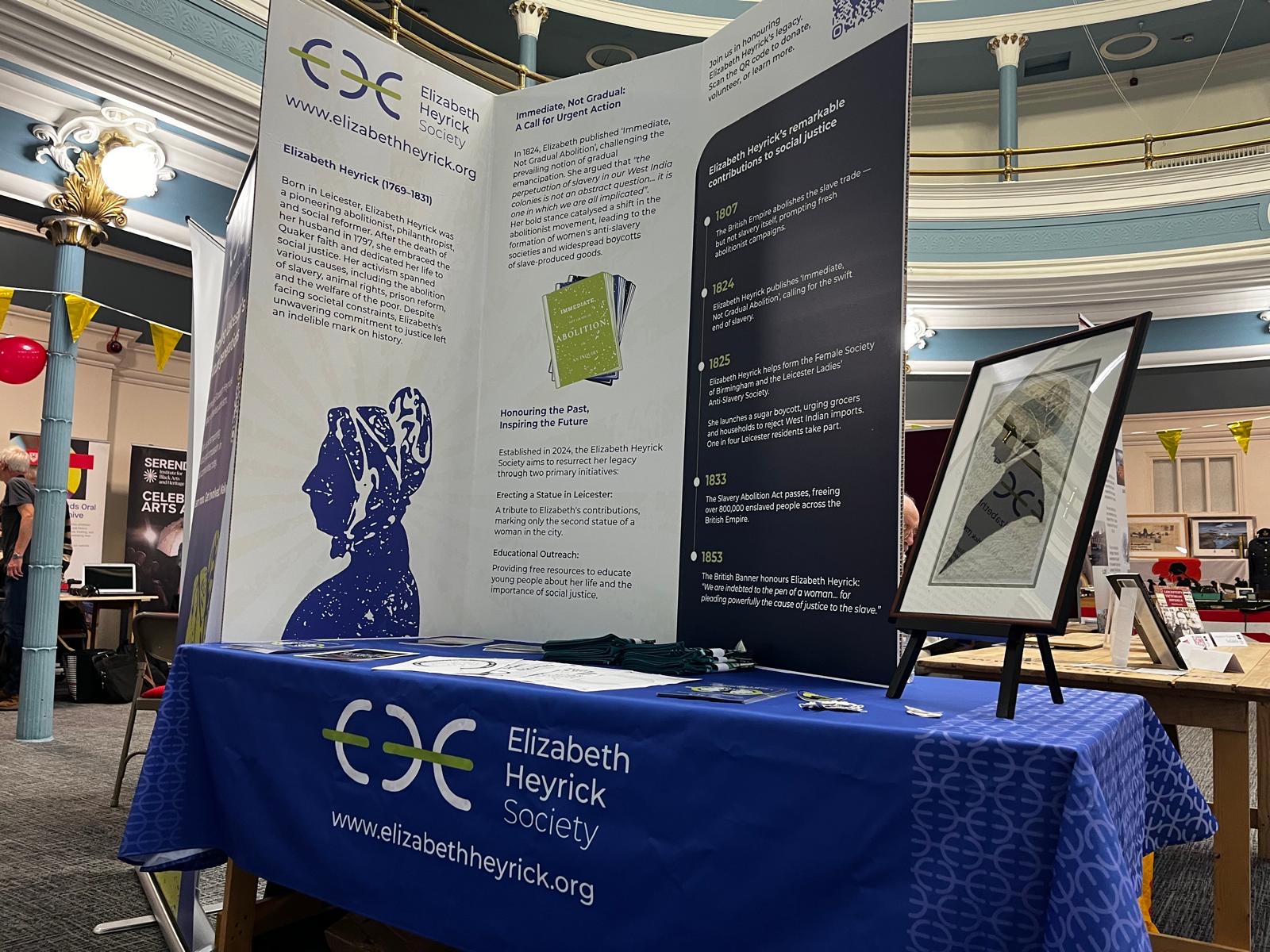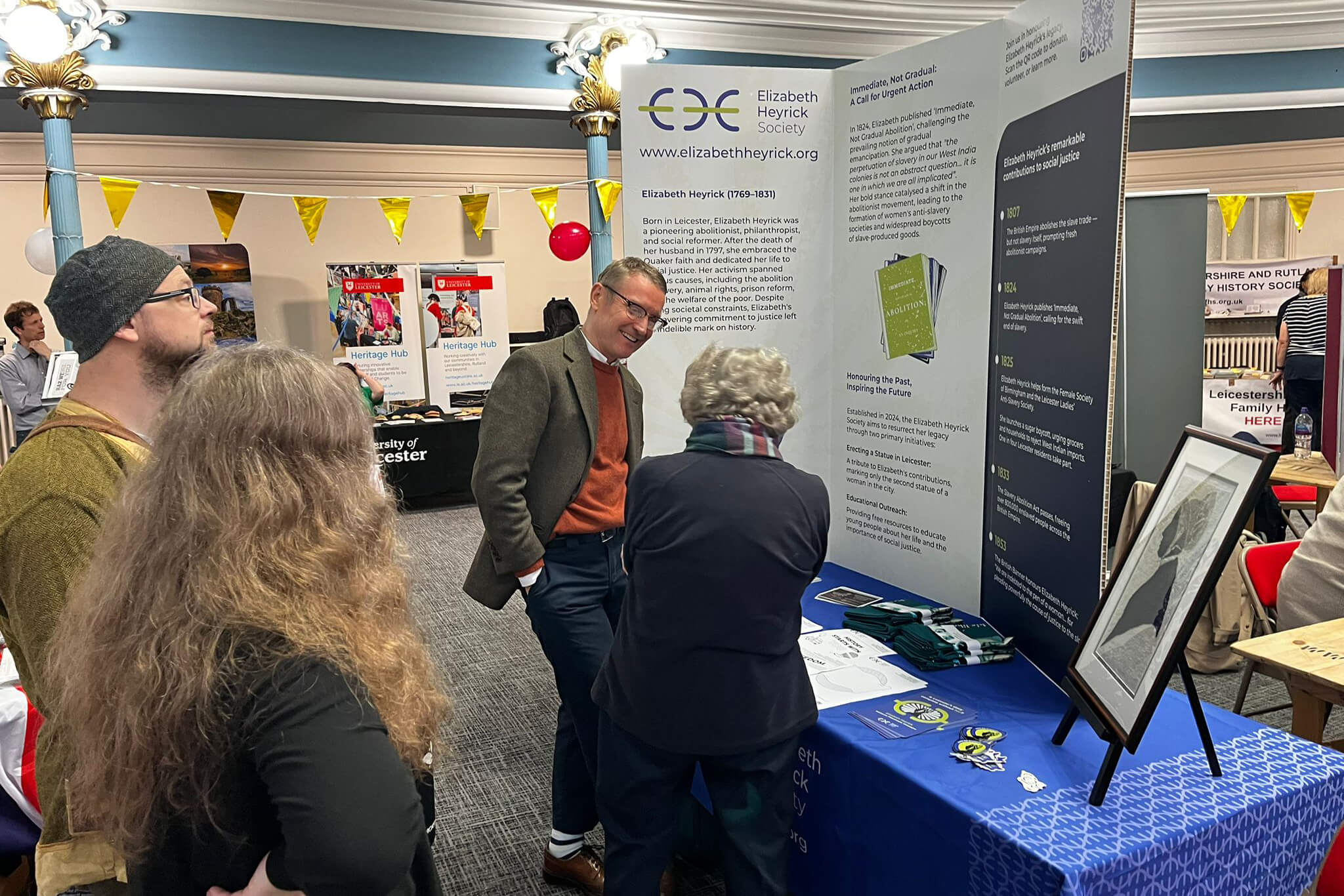On Monday 2 September, Trustees, Joshua Thorpe and Emma Lee, had the privilege of speaking to the members of the Rotary Club of Leicester.
The event was set to shine a long-overdue spotlight on one of Leicester’s most remarkable yet overlooked historical figures—Elizabeth Heyrick. The lunch was in the Rose Room at the Belmont Hotel in Leicester.
Introducing Elizabeth Heyrick: The woman who demanded change
The trustees began the presentation by introducing the Elizabeth Heyrick Society and outlining the key themes that would be explored. Attendees were promised a journey into the life of Elizabeth Heyrick—a woman whose name should be as familiar as Wilberforce’s, yet whose contributions have been unjustly forgotten.
Emma talked about why Elizabeth Heyrick should be remembered and her legacy. In 1807 the Slave Trade was abolished but no provision was made for existing slaves. The abolitionists split into two camps. The Gradualists, such as William Wilberforce, wanted a slow, decades-long end to slavery. Elizabeth Heyrick was a fierce advocate for the Immediatist camp. She believed that waiting for change meant prolonging the suffering of countless individuals. She encouraged households and grocers to buy and sell East Indian sugar rather than West Indian (slave produced) sugar. Her boycott saw over a quarter of Leicester’s shops comply, so challenging the economic foundations of slavery.
Her activism didn’t stop there. In 1824 she published her ground-breaking pamphlet, “Immediate, not Gradual Abolition”, which boldly criticised the Anti-Slavery Society’s gradual approach. Her pamphlet was a catalyst, pushing the Anti-Slavery Society to adopt an Immediatist stance, a shift that accelerated the end of slavery in the British Empire.
An advocate beyond abolition
Beyond abolition, Elizabeth fought to end bull-baiting and advocated for better factory conditions, she was a firm supporter of dignity through work. Her efforts serve as a powerful example that one determined individual can indeed change the world. Unfortunately, she didn’t live to see the full fruits of her labour. She passed away two years before the abolition of slavery.
American abolitionist William Lloyd Garrison, speaking in Glasgow in 1833, said,
“Who first gave the world the doctrine of immediate emancipation? It was a woman of England—Elizabeth Heyrick… Mrs. Heyrick was the highly respected, talented, and uncompromising friend of liberty.”
Professor Jennifer Rycenga noted,
“Elizabeth Heyrick was instrumental in changing public opinion, in shifting the minds of abolitionists, as well as in spurring the end to colonial slavery.”

The legacy lost—and the effort to reclaim It
Elizabeth Heyrick’s legacy was that despite her many ground-breaking achievements, her memory has been severely neglected – there are no monuments and few people from her home city would know her name.
When those buried in Gallowtree Gate’s cemetery were moved in 1923 to Welford Road, a communal gravestone was used so Elizabeth Heyrick’s grave is no longer marked. Her childhood and marital homes have long since been demolished. So there is nowhere to put a plaque.
Joshua spoke about the Elizabeth Heyrick Society being formed to ensure more people know about Elizabeth Heyrick’s life and achievements. The society plans to raise funds for a public statue in honour of Elizabeth Heyrick’s achievements and to work with passionate volunteers to create educational content.
The society has had support from senior officials in Leicester City Council, and Deputy Mayor Vi Dempster and Mayor Sir Peter Soulsby. We are supported by academics Professor Claire Midgley and Professor Michelle Levy, but have also received praise from academics across the world including author of King Leopold’s Ghost and Bury the Chains, Adam Hochschild, the late Director of the Wilberforce Institute, Trevor Burnard, and author of Freedom Burning, Professor Richard Huzzey.
Joshua spoke about the Findmypast initiative using actors in historical costume to highlight five historically overlooked women from across the UK, including Elizabeth Heyrick. Their press event in Leicester was attended by Elizabeth Heyrick Society trustee Jess Jenkins. Leicester’s Mayor, Sir Peter Soulsby, was also in attendance. The BBC News article featured the society’s campaign and announced its launch. You can read our news article about it here.
In terms of costs, the society has analysed a comprehensive list of statue costs in the UK and arrived at the figure of £150,000. A public memorial would increase awareness of Elizabeth Heyrick’s pivotal role in the abolitionist moment, ensuring her contributions are recognised and celebrated, help rebalance the urban landscape by providing representation for influential women who have historically been overlooked as well as providing the opportunity for the local community to actively participate in the creation of a memorial, fostering a sense of ownership and pride.
Joshua wrapped up by reminding the audience that Elizabeth Heyrick is recognised by academic historians on the UK, USA and elsewhere and a statue would provide inspiration for future generations.
There were questions about the statue: whether we had a sculptor or a shape in mind. We explained that the society has not commissioned a sculptor yet and would open to submissions when the society was closer to its goal. There was a question about how much political influence Elizabeth Heyrick had and how she managed to persuade the gradualists to adopt immediatism. Elizabeth Heyrick lived in a time when women did not have the vote and were not generally permitted to attend political meetings. Elizabeth Heyrick gained support through women’s anti-slavery societies, becoming elected treasurer of the Birmingham society and campaigning to pass a motion blocking financial support of the (male) anti-slavery societies until they adopted Immediatism.
The feedback mentioned that the presentation was very good. Bernard Greaves, a pioneer of LGBT+ rights, delivered a heartfelt vote of thanks speech and mentioned the Elizabeth Heyrick Society was part of the important efforts to write women’s achievements back into history.
Stay up to date on our latest news here.





